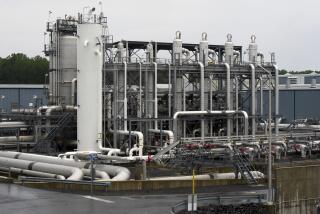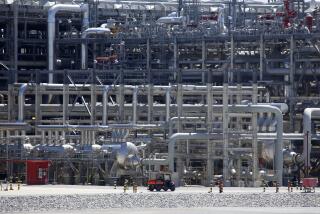Reliance on Imported Oil to Continue, Bush Cautions : Energy: He warns that despite uncertainties of supply, ‘extreme measures’ to end dependence on overseas sources would exact too great a price.
- Share via
NEW YORK — President Bush Wednesday night sent his clearest signal to date that, despite the uncertainties of foreign oil supplies, the United States for the foreseeable future will be unable to meet its voracious energy appetite without overseas help.
“We are a long way from total energy independence,” the President said in a speech to 2,400 corporate chief executives and their guests at a dinner of the New York Economic Club.
“We must avoid unwise and extreme measures that would seriously hurt American consumers, American jobs and American industries,” the President said, warning that the strict conservation measures and economic costs that would be required to end reliance on foreign energy would exact too great a price.
Bush sought in his speech and a subsequent question-and-answer session to bolster the business community’s confidence in the future of the American economy at a time of recession and uncertainty about the impact that the Persian Gulf War will have on U.S. business. It was Bush’s first trip out of Washington on matters unrelated to the Gulf War since the conflict began three weeks ago. On Friday, he visited three military bases.
“Make no mistake: The current recession does not signal any decline in the fundamental, long-term health or basic vitality of our economy,” he said. “Our Administration’s economic policies are designed to strengthen the foundation for a solid recovery and guarantee the highest possible rate of sustained economic growth.”
The speech followed by two days the President’s presentation to Congress of a $1.45-trillion federal budget for fiscal 1992, which begins on Oct. 1. And on Tuesday, Treasury Secretary Nicholas F. Brady unveiled a plan to revamp the nation’s banking system. It would permit banks to cross state lines and to enter fully into the business of marketing insurance and securities, while also phasing in limits on the amount of deposits that will be insured by the Federal Deposit Insurance Corp. The measures require congressional approval.
The President’s remarks on energy issues provide a window on the national energy strategy he is expected to unveil by the end of February. The strategy is a blueprint of the policies he is recommending to lower the United States’ vulnerability to energy shortages into the next century. It has been in preparation for two years.
The Bush effort to prepare a national energy policy follows the eight years of the Ronald Reagan Administration, during which critics said that lack of such a policy allowed the nation’s reliance on foreign oil to increase.
During his tenure as President before Reagan, Jimmy Carter pursued energy policies intended to boost the use of alternatives to the dwindling supplies of fossil fuels, among them solar energy and energy produced from agricultural byproducts.
He also encouraged conservation to cut down on the use of oil and natural gas for heating, urging Americans to turn their thermostats down to 68 degrees in the winter and providing income tax credits for the installation of insulation.
A White House official, speaking on condition of anonymity, said that Bush was seeking in his address to counter what the aide said were “unrealistic expectations” that his energy policy would encompass a strategy that would end the nation’s reliance on foreign fuel sources.
Although the figure has varied over the years since the oil shortage of 1973 forced motorists to wait in long lines at service stations to fill their gas tanks, the nation now imports about 50% of its oil.
“I don’t think anybody in his right mind would (expect) energy independence,” the White House official said.
“Our strategy,” Bush said, “is designed to reduce our vulnerability to foreign oil supply disruptions.”
But, he said, the nation must avoid “more drastic measures” intended to wean the nation entirely from its reliance on foreign energy supplies.
The obstacles to achieving total energy independence, the White House maintains, are great: Among them are the economic costs of difficult-to-attain oil-retrieval policies and implementing high-mileage fuel standards, the environmental costs of increased off-shore oil drilling and the limits to American lifestyles that strict conservation limits might impose.
Still, the President said, the policy would recognize the need to lessen the nation’s vulnerability to the shocks caused by disruptions in oil supplies from overseas.
Bush said that the strategy would propose federal, state and private measures “to increase energy efficiency and conservation.”
“It recognizes the need for creating a clean, safe environment,” he said. “It also recognizes that we must find more domestic oil and gas and use more alternative sources of energy.”
In the face of the recession, which brought to a halt the economic expansion of the 1980s, Bush said, “even a fundamentally healthy economy faces the risk of temporary disturbances and short-term setbacks.”
“The current downturn is expected to be mild and brief,” he said, adding: “While our economy may be beset by difficulty, it should not be beset by doubt.”
Inflation “has been kept under control,” he said--although it has risen significantly in recent months--and “interest rates are beginning to decline further.”
Later during the question and answer session, Bush predicted that, despite the economic blows of the Persian Gulf War, within half a year the nation will have pulled out of the recession, which he said would be “shallow.”
“In a couple of quarters we’ll come out of this and we’ll have a robust economy,” he said, predicting that there will be “a real opportunity before half a year is over to see recovery” and a national economy that is “back on a growth pattern.”
In his speech, Bush predicted that the pace of U.S. exports would continue “to set record highs.” And, he said, oil prices have “fallen substantially since their peaks in October,” particularly in the three weeks after the start of the war.
And, calling for enactment of the full range of his banking proposals, the President said: “We have to do the whole job, and we have to do it now.”
More to Read
Get the L.A. Times Politics newsletter
Deeply reported insights into legislation, politics and policy from Sacramento, Washington and beyond. In your inbox twice per week.
You may occasionally receive promotional content from the Los Angeles Times.










